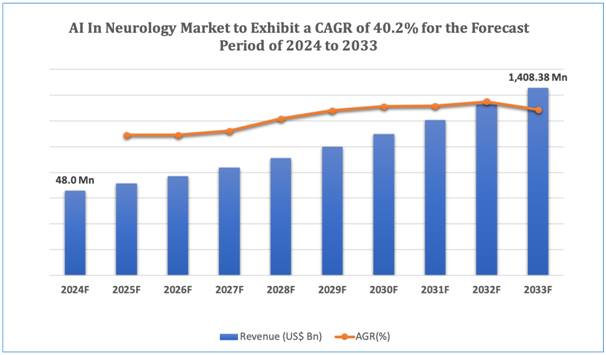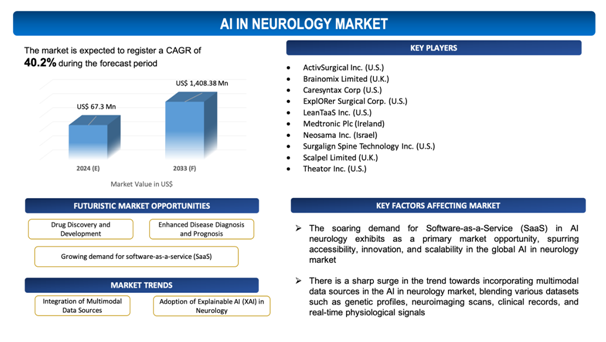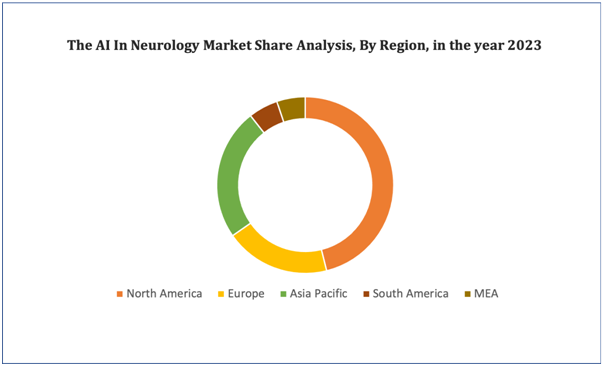AI in Neurology Market Overview
The global AI in Neurology market is estimated to be worth over USD 1,408.38 Mn in 2033 and is expected to grow at CAGR of40.2% during the forecast period (2024-2033).
Artificial Intelligence (AI) in neurology portrays a revolutionary approach to healthcare, leveraging advanced technologies to improve diagnostics, treatment, and research in neurological disorders. AI applications surround a variedscale of tools and techniques, comprising natural language processing, machine learning algorithms, and computer vision, which allow the assessment of intricate neurological data with unparalleled efficiency and accuracy. The global market for AI in neurology is experiencing significant growth, fueled by factors such as the growing prevalence of neurological disorders, increasing demand for personalized medicine, and breakthroughs in AI technologies.
Leading applications comprise neuroimaging analysis for the detection and characterization of brain lesions, predictive modeling for disease prognosis and treatment response, and precision medicine approaches tailored to individual patient profiles. In addition to that, AI-powered tools support the interpretation of electroencephalography (EEG) and electromyography (EMG) signals, allowing clinicians to diagnose and monitor conditions such as epilepsy and movement disorders more efficiently. Along with that, AI algorithms are transforming neurological research by assessing large-scale genomic and clinical datasets to uncover disease mechanisms, determine biomarkers, and develop novel therapeutics.
North America leads the global AI in neurology market, encouraged by a fusion of factors comprising advanced healthcare infrastructure, substantial investments in AI research and development, and a supportive regulatory environment. However, the market is experiencingrobust growth in other regions such as Asia-Pacific and Europe, spurred by growing adoption of AI technologies, increasing healthcare expenditures, and collaborations between academia, industry, and government. Despite the promising opportunities, challenges such as data privacy concerns, regulatory hurdles, and the need for strong validation and clinical integration of AI algorithms remain significant barriers to market expansion. Nevertheless, the convergence of AI and neurology holds colossal potential to revolutionize patient care, accelerate scientific discoveries, and ultimately improve outcomes for individuals affected by neurological disorders on a worldwide scale.
Figure 1. AI in Neurology: Market Size

Get more details on this report - Request Free Sample
Key Market Insights &Current Market Landscape:
The global AI in neurology market is witnessingexceptional growth, led by major insights and a dynamic panoramadefined by substantial developments and novel technologies. One major insight is the growing recognition of AI's potential to transform neurological care, providing advanced tools for diagnostics, treatment optimization, and research in neurological disorders. The market panorama is marked by a disparatearray of AI applications, comprising neuroimaging analysis, predictive modeling, and precision medicine approaches customized to individual patient profiles.
Significant developments comprise advancements in natural language processing, machine learning algorithms, and computer vision, allowing the assessment of complex neurological data with unprecedented efficiency and accuracy. Novel technologies such as deep learning and neural networks are fueling innovation in neurology, promoting the interpretation of neuroimaging scans, EEG signals, and genomic data to inform clinical decision-making. In parallel, AI-powered tools are transforming neurological research by uncovering disease mechanisms, determining biomarkers, and developing novel therapeutics.
North America leads the global AI in neurology market, fueled by advanced healthcare infrastructure, notable investments in AI research, and a supportive regulatory environment. However, the market is experiencingswift growth in other regions such as Europe and Asia-Pacific, spurred by soaring adoption of AI technologies and collaborations between academia, industry, and government. Notwithstanding with the promising opportunities, challenges such as data privacy concerns, regulatory impediments, and the need for robust validation and clinical integration of AI algorithms remain significant barriers to market expansion. Nevertheless, the confluence of AI and neurology holds immense potential to transform patient care, propel scientific discoveries, and enhance outcomes for individuals affected by neurological disorders across the world.
Market Dynamics
Market Drivers
Increasing Incidence of AI in Neurology
Increased data availability serves as an effective market driver for the global AI in neurology market, catalyzing progressions in diagnostics, treatment, and research. Neurological disorders cause vast amounts of intricate data, comprising genetic profiles, neuroimaging scans, clinical records, and real-time physiological signals. With the escalation of electronic health records (EHRs), wearable devices, and digital health platforms, healthcare systems have unparalleled access to comprehensive and various datasets. This wealth of data presents a specialized opportunity for AI applications to leverage machine learning algorithms and deep learning techniques to extract valuable insights, patterns, and correlations that are likely to otherwise remain hidden. AI algorithms can assess large-scale datasets with speed and precision, allowing clinicians to determine subtle neurological abnormalities, predict disease progression, and customize treatment strategies to individual patient needs. Along with that, AI-driven tools promote the union of multi-modal data sources, such as combining neuroimaging data with genomic information or clinical phenotypes, to offer a more comprehensive understanding of neurological conditions. In addition to that, the availability of annotated datasets and curated repositories supports algorithm development, validation, and benchmarking, propelling the translation of AI research into clinical practice. Along with that, collective initiatives such as data-sharing consortia and open-access platforms foster collaboration among researchers and institutions, supporting knowledge exchange and advancing AI capabilities in neurology. All in all, increased data availability encourages AI in neurology to unfasten new insights, enhance diagnostic accuracy, optimize treatment outcomes, and fuel innovation, ultimately improving patient care and advancing the understanding of neurological disorders.
Market Restraints
With regard to numerous advantages of AI in Neurology, the market faces several challenges due to the unique characteristics and requirements associated with them. Some of the key market challenges include:
- Data Privacy and Security Concerns:The delicate nature of neurological data poses asmajor concerns in regard to securityand privacy, impeding data sharing and collaboration in the AI in neurology market.Compliance with stringent data protection regulations, such as HIPAA in the United States and GDPR in Europe, adds intricacy to AI development anddeployment, cutting down innovation.
- Limited Clinical Validation and Adoption:The inadequacy of strong clinical validation and regulatory approval for AI algorithms in neurology restraints their adoption in clinical practice.Healthcare providers are likely to hesitate to integrate AI-based tools into routine care without adequate evidence of safety, efficacy, and clinical utility, downsizing market penetration and extensive adoption.
Market Opportunities
Growing demand for software-as-a-service (SaaS)
The soaring demand for Software-as-a-Service (SaaS) in AI neurology exhibits as a primary market opportunity, spurringaccessibility,innovation, and scalability in the global AI in neurology market. SaaS models provide cloud-based solutions that enable healthcare providers to access AI-powered tools and platforms remotely, without the necessity for widespread IT infrastructure or upfront investment in hardware and software. This accessibility declines barriers to entry for healthcare institutions of all sizes, comprises smaller clinics and resource-limited settings, promoting widespread adoption of AI technologies in neurology.
In similar manner, SaaS platforms provide flexible subscription-based pricing models, facilitating healthcare providers to scale services according to their particular needs and budget constraints. This scalability supports the democratization of AI in neurology, ensuring that progressive diagnostic and treatment tools are accessible to a comprehensivescale of healthcare professionals and patients across the world. In addition to that, SaaS solutions provide seamless integration with existing electronic health record (EHR) systems, improving workflow efficiency and interoperability. By centralizing data storage and assessment on secure cloud platforms, SaaS models tackle concerns associated with data privacy and security, ensuring compliance with regulatory requirements such as HIPAA and GDPR.
Alongside, SaaS providers oftentimesdeliver continuous updates and enhancements to their platforms, consolidating the latest advancements in AI algorithms and neurology research. This dynamic approach to software development ensures that healthcare providers have access to groundbreaking tools and techniques for diagnosing, treating, and researching neurological disorders. Overall, the growing demand for SaaS in AI neurology presents a substantial market opportunity, fuelingaccessibility,innovation, and scalability in the global AI in neurology market.
Market Trends
- Integration of Multimodal Data Sources:There is a sharp surge in the trend towards incorporating multimodal data sources in the AI in neurology market, blendingvarious datasets such as genetic profiles, neuroimaging scans, clinical records, and real-time physiological signals.This trend facilitates AI algorithms to assessmentintricate neurological data thoroughly, offering a more wholistic understanding of neurological disorders and improving diagnostic precision and treatment planning.By leveraging machine learning and deep learning techniques to integrate and interpret multimodal data, AI in neurology supports personalized medicine approaches customized to individual patient profiles, optimizing treatment outcomes and patient care.In parallel, the integration of multimodal data sources fosters collaboration between researchers and clinicians, supporting knowledge exchange and spurring innovation in the sector.
- Adoption of Explainable AI (XAI) in Neurology:There is a soaring trend towards the adoption of Explainable AI (XAI) techniques in the neurology market, focusing on enhancinginterpretability, transparency, and trustworthiness of AI algorithms.XAI methods allow clinicians and researchers to understand and decipher the decision-making process of AI models, offering insights into how predictions are generated and which features contribute to the outcomes.This trend addresses concerns associated with the "black-box" nature of AI algorithms, specifically in crucial applications such as medical diagnosis and treatment planning, where comprehensibility is critical.By incorporating XAI techniques into AI models, neurology practitioners can gain trust in AI-driven recommendations, enhance clinical decision-making, and in the long run,improve patient care and safety.

Get more details on this report - Request Free Sample
AI in Neurology Market: Key Segments
By Indication
- Neuro-technology
- Neurosurgery
By Application
- Screening & Diagnosis
- Treatment
- Research & Development
- Training
- Surgical Planning and Rehabilitation
- Others
By Type
- Oncology
- Neurodegeneration
- Neurovascular
- Traumatic Brain Injury
- Spinal Cord Injury
By Technology
- Machine Learning and Deep Learning
- Natural Language Processing [NLP]
- Others
By End User
- Hospitals
- Diagnosis Centres
- Others
By Key Geographical Regions
- North America
- Europe
- Asia-Pacific
- Middle East and Africa
- South America
AI in Neurology Market: Regional Analysis
North America dominates the global AI in neurology market. One of the primary reasons is that the region boasts a strong healthcare infrastructure and progressive technological capabilities, facilitating the adoption and consolidation of AI solutions in neurological care. In addition, North America is home to cutting-edge AI research institutions, academic centers, and healthcare organizations, fueling innovation and development in the sector. Along with that, favorable government initiatives, supportive regulatory frameworks, and major investments in AI technologies further accelerate market growth in the region. Collectively, these factors contribute to North America's leading position in leveraging AI for advancements in neurological diagnosis, treatment, and research.
Figure 4. AI in Neurology Market: Distribution by Region

Get more details on this report - Request Free Sample
Leading AI in Neurology Developers
Industry Trends and Global Forecasts, 2023-2035 report features an extensive study of the current market landscape, market size and future opportunities associated with the AI in Neurology market, during the given forecast period. Further, the market report highlights the efforts of several stakeholders engaged in this rapidly emerging segment of the biopharmaceutical industry. Key takeaways of the AI in Neurology market are briefly discussed below.
The report includes the list of players operating in the global AI in Neurology market. Some of the key players include:
- ActivSurgical Inc. (U.S.)
- Brainomix Limited (U.K.)
- Caresyntax Corp (U.S.)
- ExplORer Surgical Corp. (U.S.)
- LeanTaaS Inc. (U.S.)
- Medtronic Plc (Ireland)
- Neosama Inc. (Israel)
- Surgalign Spine Technology Inc. (U.S.)
- Scalpel Limited (U.K.)
- Theator Inc. (U.S.)
Recent Developments in the AI in Neurology Market
Several recent developments have taken place in the field of AI in Neurology, some of which have been outlined below. These developments, even if they took place post the release of our market report, substantiate the overall market trends that we’ve outlined in our analysis chronologically.
- In December 2023, Quibim, a company pioneering imaging biomarkers for Precision Medicine that has created AI-based software to identify early-stage neurodegenerative diseases, announced the launch of QP-Brain. This follows the product receiving an FDA 510(k) clearance from the US Food and Drug Administration, a CE mark for the European Union and a UKCA mark for the United Kingdom. This means the product is now cleared to be used by clinicians in those markets.
Scope of the Report
The market report presents an in-depth analysis of the various firms / organizations that are engaged in this market, across different segments, as defined in the below table:
|
Key Report Attributes |
Details |
|
Base Year |
2023 |
|
Forecast Period |
2024-2033 |
|
CAGR (2024-2033) |
40.2% |
|
Indication |
|
|
Application |
|
|
Type |
|
|
Technology |
|
|
End User |
|
|
Key Geographical Regions |
|
|
Key Companies Profiled |
|
